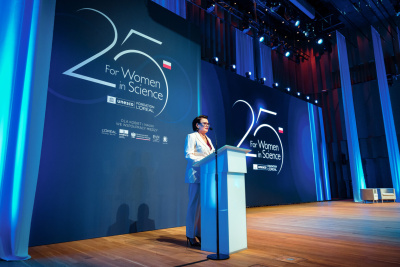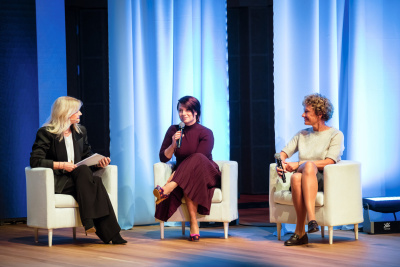
For 25 years, the L’Oréal UNESCO For Women and Science (Dla Kobiet i Nauki) programme has been promoting gender equality in the Polish academic community by supporting young, talented female scientists with scholarships that enable them to conduct advanced scientific research. The 25th anniversary Scholarship Award Gala took place on 19 November 2025 in Warsaw, and, of course, the University of Gdańsk’s representatives were in attendance! Since 2006, the chair of the scholarship programme jury has been prof. Ewa Łojkowska from the Intercollegiate Faculty of Biotechnology UG and MUG.
‘The world needs science. Science needs women’ - this has been the motto of the L'Oréal UNESCO for Women in Science programme, created in France in 1998, which inspired the Polish edition ‘For Women and Science’. ‘The 25 years of the programme's existence in Poland have been filled with determination, courage and breaking down barriers,’ said Valéry Gaucherand, President of L'Oréal Poland and the Baltic States, during the Gala. ‘This is a story of real change that we have brought to Polish science together. At the heart of this change lies an idea that has remained alive for a quarter of a century: the world needs science, science needs women. These words have become the foundation of the programme, as well as the guiding principle and signpost that has led us to where we are today.’
In the Polish edition of the competition, 137 young, outstanding female scientists have been honoured over the 25 years of its existence. Nine of the previous scholarship holders were associated with the University of Gdańsk:
- dr hab. Agata Czyż (2002)
- dr hab. Magdalena Ślusarz (2005)
- prof. dr hab. Sylwia Rodziewicz-Motowidło (2009)
- dr hab. Aleksandra Markiewicz (2014)
- dr hab. Agnieszka Gajewicz-Skrętna (2017)
- dr hab. Ewelina Król, prof. UG (2019)
- dr hab. Karolina Pierzynowska, prof. UG (2019)
- dr Magdalena Zdrowicz-Żamojć (2023)
- dr Alicja Mikołajczyk (2024)
Programme jury
Since 2006, the chair of the jury awarding L'Oréal UNESCO For Women and Science scholarships has been prof. dr hab. Ewa Łojkowska, an outstanding plant biotechnologist from the Intercollegiate Faculty of Biotechnology UG and MUG. In addition to her numerous scientific achievements (for which she has been awarded the Jan Hevelius Science Award of the City of Gdańsk, known as the ‘Gdańsk Nobel’, and the title of honorary professor of the University of Gdańsk), prof. Ewa Łojkowska has also been involved in many initiatives promoting gender equality in the world of science. She is the president of the Fahrenheit University Women's Club, co-author of the ‘Plan for the implementation of gender equality at the University of Gdańsk’ and a participant in the MINDtheGEPs project.
‘The programme's priority has always been the highest level of scientific research, innovation, and relevance to the development of new technologies that can be useful in medicine, in the creation of new therapies, in environmental protection, and in improving the quality of our lives in all areas,’ said prof. Ewa Łojkowska during the gala ceremony. ‘Our scholarship holders are developing their scientific careers and are leaders of prestigious grants, such as the Horizon 2020 programme, the Horizon Europe programme, the programmes of the Foundation for Polish Science and the National Science Centre. I believe that they should also be appreciated for their organisational activities: our laureates are deans, directors of institutes of the Polish Academy of Sciences, directors of university institutes, and among them are also directors of biotechnology companies. But our competition fulfils another function, which perhaps not everyone is aware of. We live in a world full of threats, and we encounter positive news and pleasant situations less and less often; the L'Oréal UNESCO For Women in Science programme creates an extraordinary atmosphere of pride and joy. Pride that we have such amazing scientists, researchers developing pioneering, committed, innovative research, and satisfaction that we can honour them with scholarships that allow them to fulfil at least some of their dreams.’
Prof. Grzegorz Węgrzyn from the Faculty of Biology at the University of Gdańsk is also a member of the jury representing the Polish Academy of Sciences.
‘The effect of the award: visibility as a cure for disappearance’ - report

During the gala, in a short panel discussion, prof. dr hab. Natasza Kosakowska-Berezecka from the Institute of Psychology at the Faculty of Social Sciences, University of Gdańsk, and dr hab. Magdalena Żadkowska, prof. UG from the Institute of Sociology at the Faculty of Social Sciences, University of Gdańsk, presented their report ‘The effect of the award: visibility as a cure for disappearance. On being visible in science thanks to L'Oréal-UNESCO For Women and Science’.
‘Let's start with the fact that in social psychology, we have been studying gender differences in the ability to conduct scientific research for many years, and I can tell you that we know for sure that there is no such thing as a “gender of scientific research ability”: both women and men can conduct wonderful, innovative research,’ began prof. Natasza Kosakowska-Berezecka, responding to a question about whether science in Poland has a gender. ‘But let's look at other data, also included in the report. One measure of whether science has a gender may be whether one gender is more or less visible. And here are some interesting results. For example, we ask children or teenagers to draw a character who is involved in science - in the 1960s, female characters in these drawings accounted for about 1%; in 2016, there are already more, about 30%. This is an interesting result in that it reflects the actual state of affairs: indeed, about one-third of people involved in science worldwide are women. In Poland, there are slightly more, approaching 50%, but the higher up the scientific career ladder, the fewer women there are, as can still be seen, for example, among professors. And the most striking invisibility is the lack of women among those we consider to be geniuses - research shows that genius is still associated with men, genius still means masculine. That is why our gala is so important: its role is to show that women do outstanding research! And we still have a lot of work to do here - just look at the data on the Nobel Prize, which is awarded to men 24 times more often than to women.’
Prof. Magdalena Żadkowska shared with the audience the results of a qualitative study conducted with the participation of scholarship holders of the L'Oréal-UNESCO For Women in Science programme, concerning what it is like to be a female scientist, what challenges they experience and what difficulties they face. She mentioned the glass ceiling phenomenon, the lack of inclusivity in language, and the fact that female researchers often struggle with impostor syndrome, feeling that they are not suited to conducting research and do not belong or fit into the scientific community.
‘Despite their outstanding achievements, excellent education and successes, the scholarship holders also admitted this to us,’ said the researcher. "They also mentioned situations where they appear as speakers at conferences and someone assigns them other roles, such as asking them to bring coffee, which strongly reinforces the idea that perhaps people do not see me as a scientist, perhaps they would not draw me in a picture. And here is a task for all of us: because the fact that we use feminine forms, that we are role models, that we reward, that we say “you can do it” - that is support.’
L’Oréal-UNESCO For Women and Science 2025
This year's edition of the programme was a record-breaking one in terms of both the number of candidates and the number of scholarships awarded. Out of 389 applications, the jury selected 8 winners (in previous editions, 6 scholarships were awarded annually).
The winners of the jubilee edition of L'Oréal-UNESCO For Women and Science were:
- mgr Barbara Fabjanowicz (University of Warsaw)
- mgr Aneta Magiera (Institute of Physical Chemistry, PAS)
- lek. Zuzanna Nowicka-Kaszkowiak (Medical University of Łódź)
- mgr inż. Aleksandra Rudzka (Warsaw University of Technology)
- dr inż. Anna Jarząb (Ludwik Hirszfeld Institute of Immunology and Experimental Therapy, PAS)
- dr Katarzyna Majzner (Jagiellonian University)
- dr Aleksandra Milewska (Jagiellonian University)
- dr Lidia Wróbel (International Institute of Molecular and Cell Biology in Warsaw)
We warmly congratulate all the winners!
The Gala can be viewed on Facebook: 25th L'Oréal-UNESCO For Women in Science Awards Gala | L'Oréal Group | Facebook.
